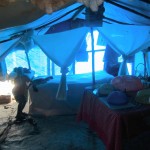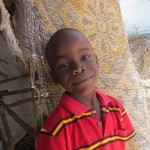Here’s a post by HFF board member Vivian Croft, who visited Jamie and Ali in Haiti a few months ago. You can read more about Vivian’s trip to Haiti here.
Last September, Clercine and her husband Auguste came to Jamie and Ali with a story not unlike so many other parents. The couple felt the had no choice but to put their younger child, daughter Melissa, in an orphanage. Without steady work, raising two children in their small community near Port-au-Prince would be nearly impossible. They felt they were out of options.
I think back to the stories my grandparents told of Depression-era living in the United States. The difficulty in securing the basic necessities, food and water, was so much a struggle that families were often torn apart by disease and hunger. More often though, they were torn apart by lack of money. That was a fear faced in our own country many years ago. It is a way of life for much of Haiti every day.
Knowing how desperately Clercine and Auguste wanted to keep their children, Jamie and Ali vowed to help them find another way – a sustainable way to live and raise two beautiful children. Fortunately, this was not new to them. In their years in Haiti, Jamie and Ali were able to help many families in the same way many times before.
The McMutrie sisters helped Clercine find steady work, a job she still holds today. But that’s not all. While this job helps Clercine and her family afford the very basic necessities, it has not impacted the family the way another small gift has.
During a visit to the family’s rural home, Jamie and Ali brought along a variety of seeds and suggested the family plant them.
Agriculture is a mainstay in Haiti and the land is fertile for many types of fruits and vegetables. Still, purchasing even a few seeds can be costly.
But to the girls, this small gesture of giving away a handful of seeds and teaching the family how to plant and grow them, the reward would not only germinate in the garden, but seeds of sustainability would improve the family’s standard of living, as well.
Today, the family has a large garden with a variety of foods that they are able to eat, share, and sell at the market. They have been successful with foods such as a variety of peppers, onions, spinach, lettuce, peaches, cherries, guava, pumpkin, okra, corn, and barley.
We met the family before church and even in their Sunday best, they proudly gave us a tour of their large plot.
They even have a small pig among the banana trees.
We each tasted a guava right off the tree.
Sharing one small gesture has changed not only the daily life of this family, but has kept them together, learning and sharing. This is what helps Haiti grow. This is what will be the future of sustainable life.
Have you ever wondered what the people who work for the non-profit organizations you donate to do all day?
While her sister, Ali, is in the U.S. attending to HFF business matters, Jamie McMutrie is spending today, Friday, January 13, 2012 like this:
5:00 a.m.: Wakes up and gets ready for the day. Every Friday is “hospital day,” when, in addition to checking in on the families HFF assists, Jamie also sees to the medical conditions of the children.
6:00 a.m.: Drives to the airport-area of Port-au-Prince where Berlancia and Simile, two infants whose mothers died in child birth and to whom we give formula, live with their families. Weighs both babies. If there are any signs of illness, Jamie takes the babies with her to be seen at a hospital later in the day. She leaves for a town about 45 minutes’ drive outside of Port-au-Prince called Cabaret.
7:30 a.m.: She arrives in Cabaret. HFF helps four families there by providing formula for infants whose mothers have died in child birth. Again, Jamie weighs the children and checks on their general condition. If any appear to need medical attention, Jamie takes them with her.
8:30 a.m.: Jamie picks up valued HFF employee Junia, who helps her with the children every Friday for “hospital day.”
9:00-10:30 a.m.: Jamie and Junia check on several children and families around Port-au-Prince, including Seth, Cliff, Bonifil, Orens, Gloria, Kervens, and the children of a mother named Chrisla. They distribute formula for the infants whose mothers have died. Each of the children mentioned above live in a different area of the city. Jamie and Junia assess the medical needs of each child and, if need be, take them to the hospital.
11:00 a.m.: Jamie and Junia arrive at the hospital with three of the children.
They also visit with the father of twin babies whose mother died giving birth to them. The twins, born prematurely, no longer need oxygen and are ready to go home with their father.
While at the hospital, Jamie and Junia will discuss with the staff if there are any other children who might need help, children who may have been abandoned there since last Friday, or have lost their mothers in child birth, or are in other kinds of crisis situations.
They also assist the beleaguered hospital staff in educating new mothers about the importance of breast feeding, about caring for premature infants, and other child-care related issues.
Late afternoon: After returning Junia and the children to their homes, Jamie will return to her own home and spend time with the three children for whom she and her staff are caring on a full-time basis.
7:00 p.m.: The children in care go to bed.
“Want a different ethic? Tell a different story”
–Thomas King
As the news page of our web site shows, lots of stories have been told about Jamie and Ali and their work before the earthquake that devastated Haiti two years ago today. Chances are you’ve heard some of these stories. Perhaps you saw the press coverage of the dramatic evacuation of the children in their care one week after the earthquake. Maybe you follow Jamie and Ali through the fantastic blog of our board member Virginia Montanez, That’s Church. Or perhaps you’ve read the eloquent article another board member, Jonathan Wander, wrote about Jamie and Ali for Pittsburgh magazine.
And I’m sure you have heard a lot of stories about the frustratingly slow process to rebuild, about contaminated drinking water and impassable roads and tent cities and rubble yet-to-be-cleared. Those are probably among the first images that come to most people’s minds when they think about Haiti, along with images of tragedy, poverty, scarcity, despair.
 It is true that most Haitians live in poverty. It is true that too many still live in tents. And it is true that many, many parents place their children in orphanages for the sole reason that they are too poor to take care of them. And here is another truth—the one we around here find the most tragic: orphanages are usually the only places families in crises can go to for help.
It is true that most Haitians live in poverty. It is true that too many still live in tents. And it is true that many, many parents place their children in orphanages for the sole reason that they are too poor to take care of them. And here is another truth—the one we around here find the most tragic: orphanages are usually the only places families in crises can go to for help.
 At least that was true before Jamie and Ali returned to Haiti and decided to refocus their dedication to children by helping families rebuild themselves. Before they dedicated themselves to changing what we think of when we think of Haiti.
At least that was true before Jamie and Ali returned to Haiti and decided to refocus their dedication to children by helping families rebuild themselves. Before they dedicated themselves to changing what we think of when we think of Haiti.
Today is a painful day for Haiti, and a painful one for those of us who feel a connection to Haiti and its people. But it is also the first day of our January campaign to raise awareness about Jamie and Ali’s Haitian Families First, a day that honors the past by changing the future. In the days to come, you’ll hear more about Junia, who we’ve introduced on our web page already, and you’ll meet other brave Haitians with whom Jamie and Ali work. You’ll hear about those of us in the U.S. who support their work. And you’ll hear in great detail how Jamie and Ali spend their days and the impact they have on people’s lives. As they go about their days living and working in Haiti, among Haitians, Jamie and Ali have noticed that, to many of the people they meet, family has become even more important than it was before the earthquake. It is the hope that remains amidst the despair.
Rubble. Tents. Scarcity. Poverty.
